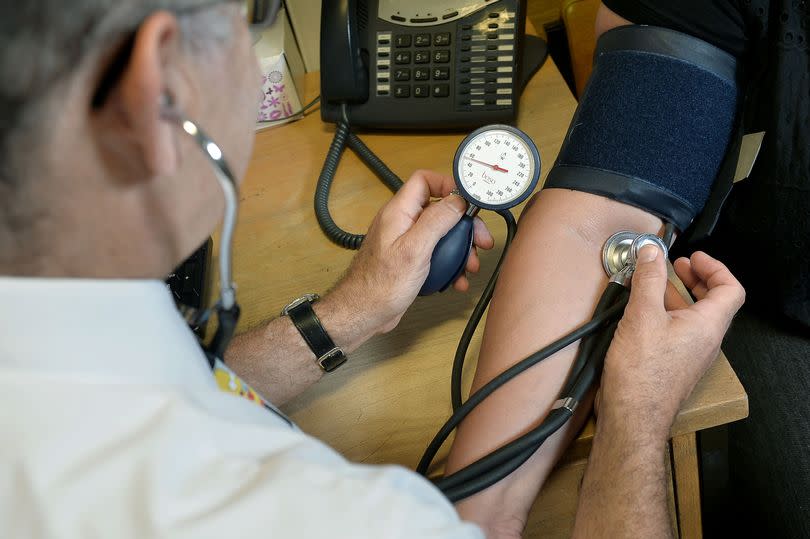Patients face NHS postcode lottery for GP appointments in Greater Manchester

New data shows that getting a doctor's appointment can be much harder in some parts of England than others.
This is often named the NHS ‘postcode lottery’, where your address can affect your healthcare. This can manifest as variations in healthcare access across different regions with some areas experiencing longer wait times or limited services compared to others.
READ MORE: Greater Manchester's NHS being plunged into 'special measures' over £180m black hole of debt
In our region, a total of 1.3 million appointments took place at GP practices in March. However, over 125,000 of those had been booked more than three weeks earlier. It works out as 8.5% of all appointments and is up slightly from 8.2% in February, but down from 9.1% in January.
The majority of patients who saw their GP in the NHS Greater Manchester Integrated Care Board area in March did so within a week of making the appointment.
Some 72.3% of appointments took place within seven days of booking. That includes 45.0% of appointments which took place on the same day.
But some places in the region had even longer waits like Springfield House in Oldham, where some 39.4% of appointments at the practice in March took place more than three weeks after booking.
Waterloo Medical Centre in Ashton-under-Lyne was next with a ratio of 30.9% of appointments taking place after three weeks, followed by Chorlton Family Practice (27.5%), Family Surgery in Stockport (26.5%), and Mandalay Medical Centre in Bolton (26.3%).
While that may not be ideal for those affected, our region is actually performing better than England as a whole.
In London, though, wait times are much shorter. Just 3.6% of appointments at GP practices in North Central London last month took place more than three weeks after being booked. That’s the lowest proportion in the country.
In North East London the proportion was just 4.0%, in North West London it was 4.5%, and in South West London it was 5.0%. That works out as 9.4% of all appointments, an increase from 8.8% of appointments in February, but marginally better than 9.5% of appointments in January. In some regions though, patients are five times as likely to have to wait over three weeks to see their GP.
On behalf of the Greater Manchester Integrated Care Board, Rob Bellingham, Chief Officer for Commissioning and Population Health at NHS Greater Manchester said: "Across Greater Manchester there has been a 13% increase in GP appointments compared to pre-pandemic levels.
“This means that many patients who want to be seen as soon as possible have shorter waiting times for their appointments – although we also are still catering for those who want to book appointments further in advance.
“While this is a really positive trend, we know that not all GP practices are the same which is why the Primary Care team is working hard to not only continue increasing the number of GP appointments available to people in Greater Manchester, but also reduce the variation in the experiences of patients across the region when it comes to the length of time they wait for appointments.”
Dr Amanda Doyle, national director for primary care, NHS England said: “Thanks to GPs and their hardworking teams, millions more appointments are being delivered every month compared to before the pandemic with plans in place to improve access even further.
“Every GP practice is upgrading their telephone systems to make it easier for patients to contact their surgery, while patients can use the NHS app to order repeat prescriptions and view their test results without needing to contact their family doctor.
“We know there is more to do to make it easier for patients to access GP services, which is why, building on the successes so far of the primary care access recovery plan we will continue to modernise general practice, expand pharmacy services, and offer patients more choice in how they access care.
Primary Care Minister Andrea Leadsom said: “Today’s figures clearly demonstrate that more people are getting the care they need, when they need it, thanks to the hard work of our GPs and their teams.
“GPs and their staff have already delivered on a number of pledges – including exceeding the target of 50 million additional general practice appointments per year, several months ahead of schedule – and through the measures in the Primary Care Recovery Plan, the NHS and primary care staff are freeing up millions of extra appointments per year and making it easier for patients to access the care they need.
“We remain committed to making our healthcare system faster, simpler and fairer for all patients so that everyone who needs an appointment is able to get one.”
Try MEN Premium for FREE by clicking here for no ads, fun puzzles and brilliant new features.

 Yahoo News
Yahoo News 
